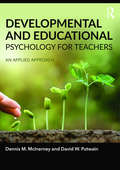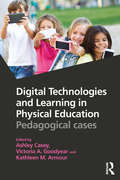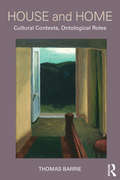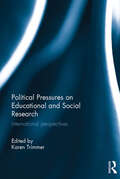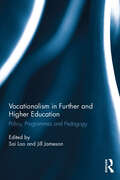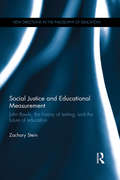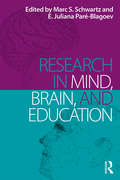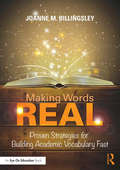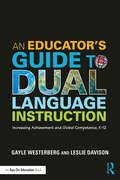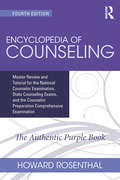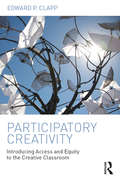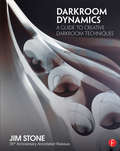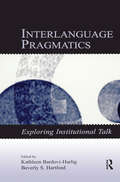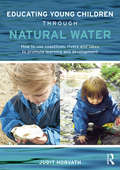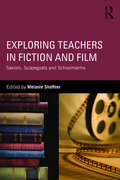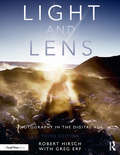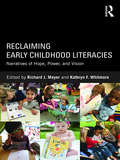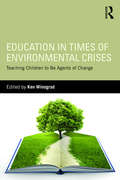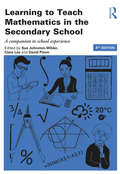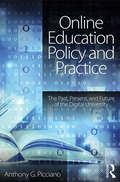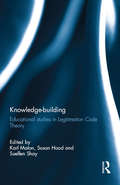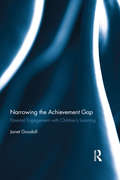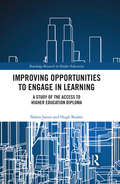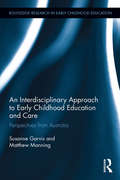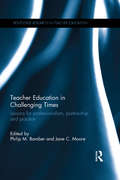- Table View
- List View
Developmental and Educational Psychology for Teachers: An applied approach
by Dennis McInerney David PutwainDevelopmental and Educational Psychology for Teachers brings together a range of evidence drawn from psychology to answer a number of critical educational questions, from basic questions of readiness – for example, when is a child ready for school, through to more complex matters, such as how does a teacher understand and promote good peer relationships in their classroom? The answers to these and other questions discussed draw here on the interplay between a teachers’ craft expertise and their knowledge of evidence and theory from developmental and educational psychology. Presenting a range of classic theories and contemporary research to help readers understand what the key issues are for teachers and other professionals, this book aides informed educational decisions in situations such as: inclusion, ability grouping, sex differences, developing creativity, home and peer influences on learning, and developing effective learners. Teachers in early years, primary and secondary settings are routinely faced with questions regarding the development of children. This not only relates to the planning and delivery of lessons, but also to the mental and physical wellbeing of the children and adolescents that they teach. The pedagogical features of this book are accessible and clearly presented, including focus questions that direct the reader’s attention to key issues, activity posts that point the reader to meaningful and relevant research and show the practical applications of material covered, and extension material that gives depth to many of the topics covered. This book aims to inform the practice of both in-service and trainee teachers, addressing issues that are relevant to their practice. With no other detailed and accessible text presenting this evidence and theory specifically for an audience of practicing and trainee teachers currently on the market, this book will be of essential reading to practicing and trainee teachers for early years, primary and secondary education and other related educational contexts such as educational psychologists, counsellors, paediatric and child doctors and nurses.
Digital Technologies and Learning in Physical Education: Pedagogical cases
by Ashley Casey, Victoria A. Goodyear and Kathleen M. ArmourThere is evidence of considerable growth in the availability and use of digital technologies in physical education. Yet, we have scant knowledge about how technologies are being used by teachers, and whether or how these technologies are optimising student learning. This book makes a novel contribution by focusing on the ways in which teachers and teacher educators are attempting to use digital technologies in PE. The book has been created using the innovative ‘pedagogical cases’ framework. Each case centres on a narrative, written by a PE practitioner, explaining how and why technology is used in their practice to advance and accelerate learning. Each practitioner narrative is then analysed by a team of experts from different disciplines. The aim is to offer a multi-dimensional understanding of the possibilities and challenges of supporting young people’s learning with digital technologies. Each case concludes with a practitioner reflection to illustrate the links between theory, research and practice. Digital Technologies and Learning in Physical Education encourages critical reflection on the use of technologies in PE. It is an essential resource for students on physical education, kinesiology or sport science courses, practitioners working in PE or youth sport, and researchers interested in digital technologies and education.
House and Home: Cultural Contexts, Ontological Roles
by Thomas BarrieHouse and home are words routinely used to describe where and how one lives. This book challenges predominant definitions and argues that domesticity fundamentally satisfies the human need to create and inhabit a defined place in the world. Consequently, house and home have performed numerous cultural and ontological roles, and have been assiduously represented in scripture, literature, art, and philosophy. This book presents how the search for home in an unpredictable world led people to create myths about the origins of architecture, houses for their gods, and house tombs for eternal life. Turning to more recent topics, it discusses how writers often used simple huts as a means to address the essentials of existence; modernist architects envisioned the capacity of house and home to improve society; and the suburban house was positioned as a superior setting for culture and family. Throughout the book, house and home are critically examined to illustrate the perennial role and capacity of architecture to articulate the human condition, position it more meaningfully in the world, and assist in our collective homecoming.
Political Pressures on Educational and Social Research: International perspectives
by Karen TrimmerPolitical Pressures on Educational and Social Research draws upon a variety of theoretical and methodological approaches to consider the problems that can arise when research findings diverge from political directions for policy. Chapters explore the impacts this can have on the researchers, as well as the influence it has on the research, including the methodology and the publication of results. The book offers innovative ways of seeing how these connect, overlap and interact, revealing particular issues of concern for researchers and evaluators in the context of research internationally. Key topics include the power and positioning of research, evidence based policy development, ethics and the importance of research that seeks to explore and discover knowledge. The book is divided into two sections. The first presents chapters from international academics, which provide a theoretical underpinning and discussion of power, policy, ethics and their influence on research resourcing, autonomy, purpose and methodology. The second section explores specific case studies and instances from the authors’ own experiences in the field. This book offers an interesting and enlightening insight into the sometimes political nature of research and will appeal to researchers, evaluators and postgraduate students in the fields of education and the social sciences. It will be of particular interest to those studying research methods.
Vocationalism in Further and Higher Education: Policy, Programmes and Pedagogy (Routledge Research in Education)
by Jill Jameson Sai LooVocationalism in Further and Higher Education presents a collection of research-based papers on the ‘English model’ of vocationalism and higher education. It argues that negative societal and political perceptions have hindered the debate about the significance and relevance of vocational education and training provision to learning, work and the economy. In this book, the writers offer unique solutions to the difficult questions that have emerged from their investigations into vocationalism in England. This edited collection brings together a group of academic experts to report and discuss their findings from many years of evidence-based research on vocationalism at three levels: macro (national and policy-making), meso (programmes and organization), and micro (individual learning and teaching). Chapters explore the key issues relating to the topic, such as policies, curriculum, learning and teaching, and work contexts. The book reflects on the diversity of related programmes, and discusses the applicability and relevance of the term ‘vocationalism’ in the light of current developments relating to higher vocational education, including occupation, employability and professionalism. This book is a timely contribution to the debate on the ‘English model’ of vocational education and will be an essential resource for researchers, practitioners and postgraduate students in the fields of vocational education, technical and vocational education and training (TVET), work-based learning, politics and policy of education, teaching and learning, higher education, and curriculum and pedagogy.
Social Justice and Educational Measurement: John Rawls, the history of testing, and the future of education (New Directions in the Philosophy of Education)
by Zachary SteinSocial Justice and Educational Measurement addresses foundational concerns at the interface of standardized testing and social justice in American schools. Following John Rawls’s philosophical methods, Stein builds and justifies an ethical framework for guiding practices involving educational measurement. This framework demonstrates that educational measurement can both inhibit and ensure just educational arrangements. It also clarifies a principled distinction between efficiency-oriented testing and justice-oriented testing. Through analysis of several historical case studies that exemplify ethical issues related to testing, this book explores and propounds speculative design principles and arguments in favour of radically democratic school reforms, which address how the future of testing might be shaped to ensure justice for all. These case studies cover the widespread use of IQ-style testing in schools during the early decades of the 20th century; the founding of the Educational Testing Service; and the recent history of test-based accountability associated with No Child Left Behind. Social Justice and Educational Measurement will be essential reading for academics, researchers and postgraduate students in education, testing and assessment, and the philosophy of education. It will also be of interest to policymakers and educational administrators.
Research in Mind, Brain, and Education
by Marc S. Schwartz E. Juliana Paré-BlagoevResearch in Mind, Brain, and Education cuts across and unites areas of Mind, Brain, and Education (MBE) to introduce foundational and emerging topics in the field. With chapters written by leading scholars, this book offers empirical research on specific topics including autism, math, reading, and emotion, as well as conceptual guidance on the role of models and epistemological considerations relevant to MBE. Each chapter seeks to provide a platform for exploring questions, tools, and models central to current work in MBE by emphasizing investigative focus and influences. Designed both as a supplementary text for advanced undergraduate or early graduate training and as an introduction for educators, researchers, and policy makers, Research in Mind, Brain, and Education showcases the collaborative, innovative, and dynamic approach to research that is fundamental to the discipline.
Making Words REAL: Proven Strategies for Building Academic Vocabulary Fast
by Joanne BillingsleyLearn how to tap into the power of imagery, communication, and collaboration to make vocabulary building fun and meaningful! Research has proven that students with a larger, more nuanced vocabulary become more proficient readers, writers, critical thinkers, and learners, making them more likely to succeed in academic environments. In this new book from Joanne M. Billingsley, an award-winning teacher and educational consultant, you will discover how to help your K-12 students expand their academic vocabulary across the content areas. Topics include: Using card sorts and video trailers to make vocabulary-building interactive; Expanding your teaching strategies to support ELLs and early readers; Building students’ word knowledge through emblematic and iconic gestures; Writing and asking scaffolded questions to get all students engaged with academic vocabulary; And much, much more! The book also features sample teacher-to-student dialogues to demonstrate how to talk about words, as well as games and activities that motivate students and help word meanings stick. No matter what subject area you teach, your students will benefit from the exciting and powerful strategies in this book.
An Educator's Guide to Dual Language Instruction: Increasing Achievement and Global Competence, K–12
by Gayle Westerberg Leslie DavisonThis user-friendly book is a key resource for teachers and administrators to ensure their school’s success in implementing and maintaining a dual language program. Authors Gayle Westerberg and Leslie Davison share their own experiences leading a dual language school, the obstacles they overcame, and the best practices they learned along the way. The book is filled with step-by-step instructions and strategies you can try immediately, as well as inspirational stories from educators in urban and rural dual language programs across the country. Topics include: Choosing a model for your dual language program and involving all stakeholders in the transition process; Marketing your program effectively to recruit students and staff, including international teachers; Implementing a standards-based instructional framework focused on direct vocabulary instruction, extensive reading, and using language in context; Setting proficiency targets and using internal and external assessments to track students’ progress; Incorporating technology for a more interactive and engaging language-learning experience. You’ll also learn how to effectively transition your program through different grade levels and build a collaborative school culture for a strong, long-lasting K–12 dual language program. Additional resources are available on the authors’ website, www.duallanguageinstruction.com.
Encyclopedia of Counseling: Master Review and Tutorial for the National Counselor Examination, State Counseling Exams, and the Counselor Preparation Comprehensive Examination
by Howard RosenthalWith more questions and answers than any other edition, the Encyclopedia of Counseling, Fourth Edition, is still the only book you need to pass the NCE, CPCE, and other counseling exams. Every chapter has new and updated material and is still written in Dr. Rosenthal's lively, user-friendly style counselors know and love. The book’s new and improved coverage incorporates a range of vital topics, including social media, group work in career counseling, private practice and nonprofit work, addictions, neurocounseling, research trends, the DSM-5, the new ACA and NBCC codes of ethics, and much, much more.
Participatory Creativity: Introducing Access and Equity to the Creative Classroom
by Edward P. ClappParticipatory Creativity: Introducing Access and Equity to the Creative Classroom presents a systems-based approach to examining creativity in education that aims to make participating in invention and innovation accessible to all students. Moving beyond the gifted-versus-ungifted debate present in many of today’s classrooms, the book’s inclusive framework situates creativity as a participatory and socially distributed process. The core principle of the book is that individuals are not creative, ideas are creative, and that there are multiple ways for a variety of individuals to participate in the development of creative ideas. This dynamic reframing of invention and innovation provides strategies for teachers, curriculum designers, policymakers, researchers, and others who seek to develop a more equitable approach towards establishing creative learning experiences in various educational settings.
Darkroom Dynamics: A Guide to Creative Darkroom Techniques - 35th Anniversary Annotated Reissue
by Jim StoneBack in print 35 years after it was first published, Jim Stone’s classic darkroom manual provides step-by-step instructions for alternative creative darkroom techniques for experimental and manipulated photography. Each technique, presented by a photographer who is an expert in its application, includes how-to illustrations and reproductions of the photographer’s work. Perfect for students of darkroom photography, including those interested in experimental photography and alternative processing.
Interlanguage Pragmatics: Exploring Institutional Talk (Second Language Acquisition Research Series)
by Kathleen Bardovi-Harlig Beverly S. HartfordThis volume brings conversational analysis into the study of second language pragmatics as an analytic paradigm. A well-regarded team of researchers addresses a difficult area for the interlanguage pragmatics research community--the balance between experimental method and the use of conversational data. Institutional talk provides authentic and consequential talk. The goal of the book is to demonstrate how the investigation of institutional talk balances the researcher's need for comparable and replicable interactions with the need to observe authentic outcomes. The chapters present empirical studies based on quantitative and qualitative analyses, which are carefully illustrated by the real-world variables that each institution controls. The chapters span a range of institutions, including the university writing center, hotels, secondary schools, and employment offices. The variables examined include the traditional ILP variables, such as status, directness, and social distance, as well as new concepts like trust, authority, equality and discourse style.
Educating Young Children through Natural Water: How to use coastlines, rivers and lakes to promote learning and development
by Judit HorvathCoastlines, rivers and natural waters have a huge amount to offer young children, providing a unique environment for their learning and development. The environment and its almost daunting size touches something deep within the children and – surprisingly – the large space brings them closer together. This book provides a comprehensive guide to Natural Water School provision by exploring its special pedagogy, the organisation and management of the Water School session and discussing the learning environment and its implications for children’s wellbeing and development. It clearly explains the key principles of this recently developed, contemporary approach and sets out a framework for setting up and leading a Natural Water School programme. The book shows how the aims and outcomes of early years education, including the Early Years Foundation Stage can all be achieved within the Natural Water School environment and is supported by examples and case studies throughout. Full of practical suggestions and activities, it includes: Activity ideas covering topics such as wildlife, sensory activities, crafts, social development, physical play and construction in different seasons Unique teaching tools to observe and develop the children Ideas for working with children of different ages and learning styles Detailed guidance on health and safety including risk assessments Offering a sound historical background, a solid pedagogical framework and a step-by-step guide to Natural Water School practice, this handy text will help students and practitioners to fully understand this new and increasingly popular approach to early years education and how it can benefit the children they care for.
Exploring Teachers in Fiction and Film: Saviors, Scapegoats and Schoolmarms
by Melanie ShoffnerThis book about teachers as characters in popular media examines what can be learned from fictional teachers for the purposes of educating real teachers. Its aim is twofold: to examine the constructed figure of the teacher in film, television and text and to apply that examination in the context of teacher education. By exploring the teacher construct, readers are able to consider how popular fiction and film have influenced society’s understandings and views of classroom teachers. Organized around four main themes—Identifying with the Teacher Image; Constructing the Teacher with Content; Imaging the Teacher as Savior; The Teacher Construct as Commentary—the chapters examine the complicated mixture of fact, stereotype and misrepresentation that create the image of the teacher in the public eye today. This examination, in turn, allows teacher educators to use popular culture as curriculum. Using the fictional teacher as a text, preservice—and practicing—teachers can examine positive and negative (and often misleading) representations of teachers in order to develop as teachers themselves.
Light and Lens: Photography in the Digital Age
by Robert HirschThe new edition of this pioneering book allows students to acquire an essential foundation for digital photography. Fully updated, it clearly and concisely covers the fundamental concepts of imagemaking, how to use digital technology to create compelling images, and how to output and preserve images in the digital world. Exploring history, methods, and theory, this text offers classroom-tested assignments and exercises from leading photographic educators, approaches for analyzing, discussing, and writing about photographs, and tools to critically explore and make images with increased visual literacy. New to this edition: • New larger page format • Revised and renewed to reflect technological advances • Expanded coverage of smartphone/mobile photography • Extended coverage of the careers section • More than 100 new images
Reclaiming Early Childhood Literacies: Narratives of Hope, Power, and Vision
by Richard J. Meyer Kathryn F. WhitmoreAt a time when literacy has become more of a political issue than a research or pedagogical one, this volume refocuses attention on work with young children that places them at the center of their literacy worlds. Drawing on robust and growing knowledge which is often marginalized because of political and legislative forces, it explores young children’s literacies as inclusive, redefined, and broadened—encompassing technologies, the arts, multiple modalities, and teaching and learning for democracy, cultural sustainability and social justice. Highlighted themes include children’s rights to grow through playful engagements with multiple literacies to interrogate their worlds; adults who expand and inspire children’s consciousness and awareness of others and the world around them; the centrality of meaning making in all aspects of language and literacy development; a deep respect for diversities, including languages, cultures, sexual orientation, socioeconomic status and more; and an expansive understanding of the nature of texts.
Education in Times of Environmental Crises: Teaching Children to Be Agents of Change
by Ken WinogradThe core assumption of this book is the interconnectedness of humans and nature, and that the future of the planet depends on humans’ recognition and care for this interconnectedness. This comprehensive resource supports the work of pre-service and practicing elementary teachers as they teach their students to be part of the world as engaged citizens, advocates for social and ecological justice. Challenging readers to more explicitly address current environmental issues with students in their classrooms, the book presents a diverse set of topics from a variety of perspectives. Its broad social/cultural perspective emphasizes that social and ecological justice are interrelated. Coverage includes descriptions of environmental education pedagogies such as nature-based experiences and place-based studies; peace-education practices; children doing environmental activism; and teachers supporting children emotionally in times of climate disruption and tumult. The pedagogies described invite student engagement and action in the public sphere. Children are represented as ‘agents of change’ engaged in social and environmental issues and problems through their actions both local and global.
Learning to Teach Mathematics in the Secondary School: A companion to school experience (Learning to Teach Subjects in the Secondary School Series)
by David Pimm Sue Johnston-Wilder Clare LeeLearning to Teach Mathematics in the Secondary School combines theory and practice to present a broad introduction to the opportunities and challenges of teaching mathematics in the secondary school classroom. This fourth edition has been fully updated to reflect the latest changes to the curriculum and research in the field, taking into account key developments in teacher training and education, including examinations and assessment. Written specifically with the new and student teacher in mind, the book covers a wide range of issues related to the teaching of mathematics, such as: why we teach mathematics the place of mathematics in the National Curriculum planning, teaching and assessing for mathematics learning how to communicate mathematically using digital technology to advance mathematical learning working with students with special educational needs post-16 teaching the importance of professional development the affective dimension when learning mathematics, including motivation, confidence and resilience Already a major text for many university teaching courses, this revised edition features a glossary of useful terms and carefully designed tasks to prompt critical reflection and support thinking and writing up to Masters Level. Issues of professional development are also examined, as well as a range of teaching approaches and styles from whole-class strategies to personalised learning, helping you to make the most of school experience, during your training and beyond. Designed for use as a core textbook, Learning to Teach Mathematics in the Secondary School provides essential guidance and advice for all those who aspire to be effective mathematics teachers.
Online Education Policy and Practice: The Past, Present, and Future of the Digital University
by Anthony G. PiccianoOnline Education Policy and Practice examines the past, present, and future of networked learning environments and the changing role of faculty within them. As digital technologies in higher education increasingly enable blended classrooms, collaborative assignments, and wider student access, an understanding of the creation and ongoing developments of these platforms is needed more than ever. By investigating the history of online education, the rise and critique of MOOCs, the mainstreaming of social media, mobile devices, gaming in instruction, and more, this expansive book outlines a variety of potential scenarios likely to become realities in higher education over the next decade.
Knowledge-building: Educational studies in Legitimation Code Theory (Legitimation Code Theory)
by Karl Maton Susan Hood Suellen ShayEducation and knowledge have never been more important to society, yet research is segmented by approach, methodology or topic. Legitimation Code Theory or ‘LCT’ extends and integrates insights from Pierre Bourdieu and Basil Bernstein to offer a framework for research and practice that overcomes segmentalism. This book shows how LCT can be used to build knowledge about education and society. Comprising original papers by an international and multidisciplinary group of scholars, Knowledge-building offers the first primer in this fast-growing approach. Through case studies of major research projects, Part I provides practical insights into how LCT can be used to build knowledge by: - enabling dialogue between theory and data in qualitative research - bringing together quantitative and qualitative methodologies in mixed-methods research - relating theory and practice in praxis - conducting interdisciplinary studies with systemic functional linguistics Part II offers a series of studies of pressing issues facing knowledge-building in education and beyond, encompassing: - diverse subject areas, including physics, English, cultural studies, music, and design - educational sites: schooling, vocational education, and higher education - practices of research, curriculum, pedagogy and assessment - both education and informal learning contexts, such as museums and masonic lodges Carefully sequenced and interrelated, these chapters form a coherent collection that gives a unique insight into one of the most thought-provoking and innovative ways of building knowledge about knowledge-building in education and society to have emerged this century. This book is essential reading for all serious students and scholars of education, sociology and linguistics.
Narrowing the Achievement Gap: Parental Engagement with Children’s Learning (Routledge Research in Education)
by Janet GoodallNarrowing the Achievement Gap proposes a radical change to our conception of learning, education and schooling, arguing that parental engagement is the best lever we have for school improvement and closing the achievement gap. Unique in its focus on original research linking underachievement and parental engagement, this book uses a range of international case studies to demonstrate that achievement isn’t only reliant on what happens in school and that what happens out of school is equally important. Each chapter explores how schools can actively engage with parents and communities to reinstate education in the home, and to generate support to combat issues out of their control, including poverty, deprivation, and a lack of social capital. Although schools have an integral part to play in this process, it argues that parents and society must reconsider their own educational responsibility, regardless of background, and offers a solid research base and practical suggestions to help do so. Consisting of an in-depth and contemporary study of this significant issue in educational achievement and written by an expert in the field, this text will appeal to researchers, academics and postgraduate students in the fields of education, schooling, sociology of education, school effectiveness and improvement, school policy and school leadership.
Improving Opportunities to Engage in Learning: A Study of the Access to Higher Education Diploma (Routledge Research in Higher Education)
by Hugh Busher Nalita JamesImproving Opportunities to Engage in Learning investigates the experiences of mature adult learners returning to formal education. The book challenges the policy discourses in which Access to Higher Education survives by suggesting that continuing education is more about determination by students to alter their identities and career opportunities than meeting narrow performative criteria of financial targets. Chapters explore students’ struggles with institutional and social structures in the current political and socio-economic climate, before identifying how the transformation of their learner identities is facilitated in the courses by collaborative cultures and supportive tutors. The book addresses a research gap in knowledge about students’ and tutors’ experiences of Access to Higher Education courses, presenting a broad perspective on the importance and difficulties of such courses through listening to the voices of students and tutors undertaking a variety of Access to HE pathways. The authors argue that despite success on their courses benefiting the national economy as well as students individually, the social and financial costs of continuing education is almost entirely shifted onto students’ shoulders by policymakers. Despite the costs, students can still see Access to HE as a chance to improve their lives, reflecting the neoliberal discourse of personal responsibility and risk embedded in broader national social and policy discourses. Improving Opportunities to Engage in Learning will be of great interest to researchers, academics and postgraduate students in the fields of further and higher education, widening participation, social justice and sociology of education, and education policy and politics.
An Interdisciplinary Approach to Early Childhood Education and Care: Perspectives from Australia (Routledge Research in Early Childhood Education)
by Susanne Garvis Matthew ManningAn Interdisciplinary Approach to Early Childhood Education and Care explores early childhood education and care in Australia from a variety of perspectives, highlighting the complexity of working within the field and the need for a truly interdisciplinary approach. It argues that only a holistic understanding of each perspective will allow a clear future for early childhood education within Australia, and that all government parties should provide better outcomes around policy and provision to ensure the support and development of the sector. Chapters offer insights into how children and families are positioned in educational reform by examining current government policy, as well as individual and collective initiatives. Key paradigms considered include positivist, behavioural, developmental, economic, sociocultural, and postmodern models. Garvis and Manning identify challenges to the field and propose improvements needed to develop an interdisciplinary approach to help close the disadvantage gap on educational outcomes. With recommendations aimed at stakeholders within different disciplines, it is hoped that this book will encourage significant improvements to early childhood education and care within Australia. Providing important insights into the landscape of early childhood education and care, this book will promote new ways of thinking of policy and provision development for the future. As such, it will be of interest to researchers, academics, and postgraduate students in the fields of early years education, education policy and politics, and sociology of education, as well as those studying childcare alongside economics, criminology and sociology.
Teacher Education in Challenging Times: Lessons for professionalism, partnership and practice (Routledge Research in Teacher Education)
by Philip M Bamber Jane C MooreTeacher education is experiencing a period of dramatic and arguably irrevocable change within a wider context of turbulence in the English education system. With contributions from a range of teacher educators and academics in the field, Teacher Education in Challenging Times presents sustainable, robust, and informed responses to the challenges posed by the current unrest in the education sector. This book considers the nature of teacher professionalism, the nurturing of truly collaborative partnerships between universities, schools and other agencies, and developments in practice with tangible impact for children and young people. Drawing on important research and illustrations of policy and practice from England and other countries, chapters present a series of counter-cultural ideas, principles and practices that respond to pressing challenges facing educators in a range of contexts. Positive and forward-looking, this book offers a robust defence of the present need for high-quality teacher education in challenging times. This book is a timely contribution to an international debate about the future of teacher educators and should be of key interest to academics, researchers and postgraduate students in the fields of teacher education, philosophy and sociology of education, policy and politics of education, and pedagogy. It will also appeal to a range of practitioners, including trainers, local authority officers, professional groups, educational service providers, and educational and school improvement consultants.
